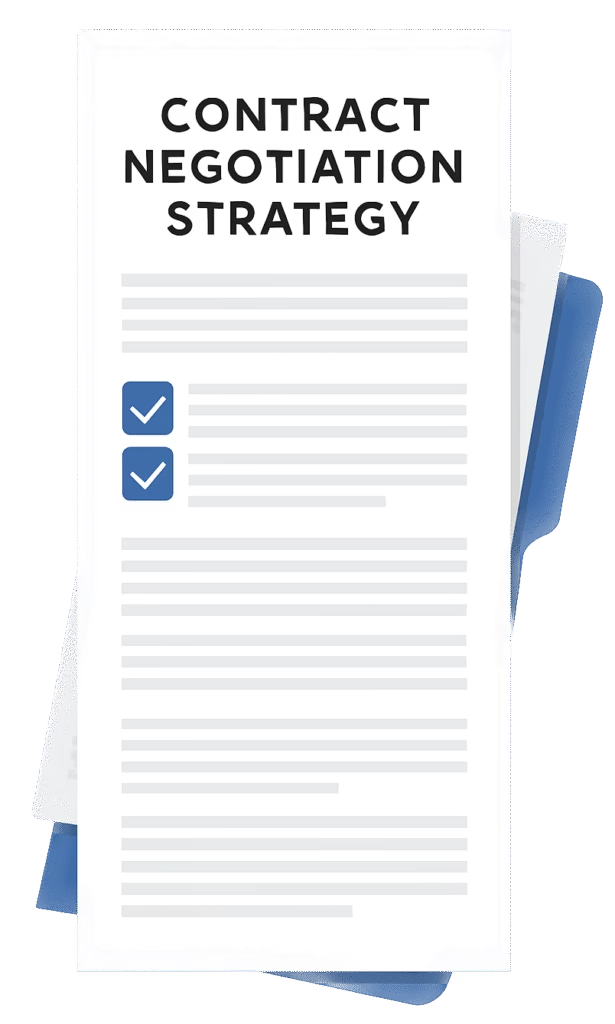Understanding the Basics of Contract Negotiation for Startups

As a startup founder, you’re likely juggling countless responsibilities—product development, fundraising, team building, and customer acquisition, to name a few. Amid this whirlwind, contract negotiation might seem like just another task to check off your list. However, mastering the art of contract negotiation is a critical skill that can make or break your startup’s success. Contracts are the backbone of your business relationships, governing everything from vendor agreements to client deals and employee contracts. For resource-constrained startups, understanding the basics of contract negotiation is not just a legal necessity—it’s a strategic advantage.
This article kicks off our series on Contract Negotiation Strategies for Startups by diving into the essentials: what contract negotiation is, why it matters for startups, the key elements of a contract, and the common types of contracts startups encounter. Whether you’re signing your first vendor deal or navigating a complex partnership agreement, this guide will equip you with the foundational knowledge to negotiate with confidence.
What Is Contract Negotiation?
At its core, contract negotiation is the process of discussing and agreeing on the terms of a legally binding agreement between two or more parties. It involves back-and-forth communication to align expectations, clarify obligations, and ensure that the final contract reflects the interests of all parties involved. For startups, negotiation is about striking a balance: securing favorable terms while maintaining positive relationships with partners, clients, or employees.
Unlike large corporations with dedicated legal teams, startups often negotiate contracts with limited resources, making preparation and clarity essential. Effective negotiation isn’t about “winning” at the expense of the other party—it’s about crafting agreements that are fair, clear, and mutually beneficial, setting the stage for long-term success.
Why Contract Negotiation Matters for Startups
Startups operate in a high-stakes environment where every decision can have outsized consequences. A poorly negotiated contract can lead to financial strain, legal disputes, or missed opportunities, while a well-negotiated contract can unlock growth, protect your interests, and build trust with stakeholders. Here’s why contract negotiation is especially critical for startups:
- Resource Constraints: Startups often lack the cash flow or legal expertise of larger companies. Negotiating favorable payment terms, such as extended payment schedules or milestone-based payouts, can preserve cash flow and reduce financial pressure.
- Risk Mitigation: Contracts define liabilities, responsibilities, and protections. A poorly worded contract could expose your startup to unexpected risks, such as intellectual property disputes or costly litigation. Strong negotiation ensures your interests are safeguarded.
- Relationship Building: Startups rely heavily on partnerships—with vendors, clients, or investors. Thoughtful negotiation fosters trust and lays the foundation for long-term collaboration, which is critical for scaling.
- Scalability: As your startup grows, contracts will need to evolve. Negotiating flexible terms early on (e.g., scalable pricing with vendors or renegotiation clauses) ensures your agreements can adapt to your startup’s changing needs.
- Competitive Edge: A well-negotiated contract can give you an edge, whether it’s securing exclusive terms with a supplier or locking in a high-value client deal before competitors do.
For startups, every contract is an opportunity to maximize value, minimize risk, and position the business for growth. Understanding the mechanics of negotiation is the first step toward seizing that opportunity.
Generate A Free Contract Negotiation Strategy Document
Create a comprehensive contract negotiation strategy document using proven frameworks like BATNA, ZOPA, and other negotiation models.

Key Elements of a Contract
Before diving into negotiations, it’s crucial to understand the anatomy of a contract. A contract is a legally binding agreement that outlines the rights, responsibilities, and expectations of all parties. While contracts vary in complexity, most include the following key elements:
- Offer and Acceptance: The contract begins with one party making an offer (e.g., a vendor agreeing to supply materials at a specific price) and the other party accepting it. Negotiations often focus on refining the terms of the offer.
- Consideration: This refers to what each party gives or receives (e.g., payment for services, equity for investment). Negotiating fair consideration ensures both parties feel the deal is equitable.
- Mutual Agreement: Both parties must agree to the terms without coercion or misrepresentation. Negotiations aim to reach this mutual understanding, often through compromises or clarifications.
- Clear Terms and Conditions: These outline the specifics of the agreement, such as deliverables, timelines, payment schedules, and performance expectations. Startups should negotiate for clarity to avoid ambiguity that could lead to disputes.
- Legal Capacity and Legality: All parties must have the authority to enter the contract, and the contract’s purpose must comply with applicable laws. For startups, this means ensuring compliance with local regulations, especially in cross-border deals.
- Termination and Remedies: Contracts should specify how and when they can be terminated (e.g., for non-performance) and what remedies are available if one party fails to meet their obligations. Negotiating these clauses can protect startups from being locked into unfavorable agreements.
Understanding these elements helps startups approach negotiations with a clear framework, ensuring all critical aspects are addressed before signing.
Common Types of Contracts Startups Encounter
Startups engage with a variety of contracts, each with unique negotiation challenges. Below are the most common types and key considerations for negotiating them:
- Vendor and Supplier Contracts
- Examples: Agreements with manufacturers, software providers, or office space landlords.
- Negotiation Focus: Secure flexible payment terms (e.g., net 60 instead of net 30), volume discounts, or scalability clauses to accommodate growth. For example, a SaaS startup might negotiate tiered pricing with a cloud provider to keep costs manageable as user numbers increase.
- Key Tip: Prioritize vendors who offer long-term partnership potential, but negotiate exit clauses to avoid being locked in if their service falters.
- Client or Customer Contracts
- Examples: Service agreements, subscription contracts, or project-based deals.
- Negotiation Focus: Ensure clear scope definitions to prevent scope creep, negotiate payment milestones for cash flow stability, and include clauses for late payments or penalties. For instance, a marketing startup might negotiate a retainer model to ensure predictable revenue.
- Key Tip: Balance client demands with your startup’s capacity to deliver, and avoid overcommitting to unrealistic timelines.
- Partnership Agreements
- Examples: Joint ventures, strategic alliances, or co-marketing agreements.
- Negotiation Focus: Clarify roles, responsibilities, and revenue-sharing models. Protect your intellectual property and ensure alignment on goals. For example, a tech startup partnering with a larger firm might negotiate to retain ownership of any co-developed IP.
- Key Tip: Negotiate for flexibility to revisit terms as the partnership evolves, especially if the partner’s priorities shift.
- Employment Contracts
- Examples: Agreements with co-founders, early employees, or contractors.
- Negotiation Focus: Structure competitive compensation packages (e.g., equity, bonuses) while preserving cash. Include vesting schedules for equity and clear performance expectations. For instance, a startup might offer a key engineer equity with a four-year vesting period to incentivize long-term commitment.
- Key Tip: Negotiate non-compete and confidentiality clauses to protect your startup’s proprietary information.
- Investor Agreements
- Examples: Term sheets, shareholder agreements, or convertible notes.
- Negotiation Focus: Negotiate valuation, equity stakes, and control provisions (e.g., board seats). Ensure terms align with your startup’s long-term vision. For example, a founder might push for a higher valuation to retain more equity while offering investors preferred returns.
- Key Tip: Seek legal advice early, as investor contracts can have long-term implications for control and growth.
Getting Started: Practical Tips for Startups
To set the stage for successful contract negotiations, consider these foundational steps:
- Do Your Homework: Research the other party’s goals, financial health, and negotiation style. For example, if negotiating with a vendor, check their pricing models or customer reviews on platforms like X or industry forums.
- Define Your Priorities: Identify your must-haves (e.g., flexible payment terms) versus nice-to-haves (e.g., priority support). This clarity helps you stay focused during negotiations.
- Involve Experts When Needed: While startups may lack in-house legal teams, consulting a lawyer for complex contracts (e.g., investor or IP-heavy agreements) can prevent costly mistakes.
- Practice Clear Communication: Avoid jargon and ensure all terms are unambiguous. For example, instead of “timely delivery,” specify “delivery within 7 business days.”
- Document Everything: Keep records of all negotiation discussions, including emails and verbal agreements, to avoid misunderstandings later.
Conclusion
For startups, contract negotiation is more than a legal formality—it’s a strategic tool to secure resources, protect interests, and build partnerships that fuel growth. By understanding the basics of contract negotiation, including the key elements of a contract and the types of agreements you’ll encounter, you can approach negotiations with confidence and clarity. As we continue this series, we’ll dive deeper into specific strategies, such as preparing for negotiations, mastering key clauses, and leveraging limited resources to secure favorable terms.
Ready to negotiate your next contract? Start by identifying the type of agreement you’re facing and mapping out your priorities. With the right preparation, even a resource-strapped startup can negotiate like a pro.
Earnest is the founder & CEO of RamenLegal. He's passionate about African startups and helping them scale globally with technology.
Earnest is the founder & CEO of RamenLegal. He's passionate about African startups and helping them scale globally with technology.
2 Comments
Comments are closed.




[…] Negotiating termination clauses requires a strategic approach to ensure that they provide adequate protection while maintaining fairness for all parties involved. Here are key strategies to consider: […]
[…] navigating payment terms can be complex, especially for those new to contract negotiations. Misaligned or poorly defined payment terms can lead to delayed payments, strained relationships, […]